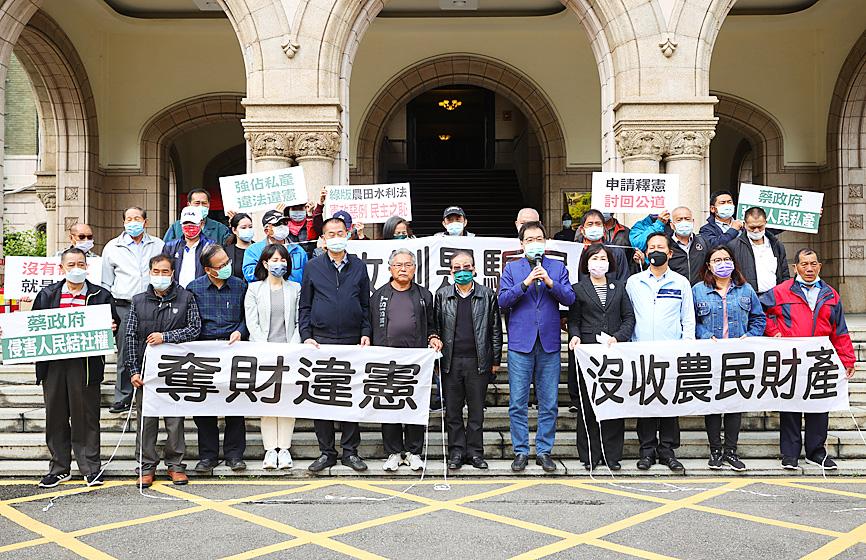A group of Chinese Nationalist Party (KMT) lawmakers yesterday sought a constitutional interpretation over the government’s move to nationalize irrigation associations.
The Legislative Yuan in July last year passed the Act of Irrigation (農田水利法) that converted 17 irrigation associations nationwide into a government body.
The Council of Agriculture in October last year inaugurated the Agency of Irrigation to oversee the associations, whose assets are valued at about NT$75.6 billion (US$2.67 billion).

Photo: CNA
Prior to the enactment, KMT lawmakers had opposed the move by seeking a constitutional interpretation, basing claims on Article 40 of the Organic Regulations for Irrigation and Water Conservancy Associations (農田水利會組織通則); but the appeal on Aug. 28 last year was turned down by the Council of Grand Justices, which said that the lawmakers had failed to meet standards outlined in the Act on the Council of Grand Justices Reviewing Constitutional Interpretation Requests (司法院大法官審理案件法).
In a second attempt yesterday, 38 KMT lawmakers tendered another request for the council to issue a constitutional interpretation of articles 23 and 34 of the Irrigation Act.
The Irrigation Act contravenes freedom of association and amounts to government seizure of private property, the lawmakers said, adding that it harms Taiwan’s democratic governance.
Based on the principle that laws should not be retroactive and the principle of legitimate expectation, associations should not be eliminated by a new law, the legislators said, citing the example of the Red Cross Society continuing to exist despite the abolishment of the Red Cross Society act in 2016.
The associations should continue to exist and would simply fall under the jurisdiction of the Civil Associations Act (人民團體法) and the Civil Code, they said.
The new act also contravenes the principles of legal reservation and proportionality, they said.
The abolishment of associations must have a legal basis — which the government lacks — and such an action should only be taken if there is a need to ensure the public good, the lawmakers said.
The irrigation associations have demonstrated that they are entirely capable of autonomous operation, they said.
The legislators also cited Article 8 of the Water Act (水利法), which designated the associations as a public corporation, saying that the Ministry of the Interior has no jurisdiction over association property, which should remain private.
The request was received by Hsu Chen-chou (許辰舟), head of the Council of Grand Justices’ Clerk Office.
The council’s response to the request would depend on whether it is up to standard, Hsu said.

The manufacture of the remaining 28 M1A2T Abrams tanks Taiwan purchased from the US has recently been completed, and they are expected to be delivered within the next one to two months, a source said yesterday. The Ministry of National Defense is arranging cargo ships to transport the tanks to Taiwan as soon as possible, said the source, who is familiar with the matter. The estimated arrival time ranges from late this month to early next month, the source said. The 28 Abrams tanks make up the third and final batch of a total of 108 tanks, valued at about NT$40.5 billion

Two Taiwanese prosecutors were questioned by Chinese security personnel at their hotel during a trip to China’s Henan Province this month, the Mainland Affairs Council (MAC) said yesterday. The officers had personal information on the prosecutors, including “when they were assigned to their posts, their work locations and job titles,” MAC Deputy Minister and spokesman Liang Wen-chieh (梁文傑) said. On top of asking about their agencies and positions, the officers also questioned the prosecutors about the Cross-Strait Joint Crime-Fighting and Judicial Mutual Assistance Agreement, a pact that serves as the framework for Taiwan-China cooperation on combating crime and providing judicial assistance, Liang

A group from the Taiwanese Designers in Australia association yesterday represented Taiwan at the Midsumma Pride March in Melbourne. The march, held in the St. Kilda suburb, is the city’s largest LGBTQIA+ parade and the flagship event of the annual Midsumma Festival. It attracted more than 45,000 spectators who supported the 400 groups and 10,000 marchers that participated this year, the association said. Taiwanese Designers said they organized a team to march for Taiwan this year, joining politicians, government agencies, professionals and community organizations in showing support for LGBTQIA+ people and diverse communities. As the first country in Asia to legalize same-sex

MOTIVES QUESTIONED The PLA considers Xi’s policies toward Taiwan to be driven by personal considerations rather than military assessment, the Epoch Times reports Chinese President Xi Jinping’s (習近平) latest purge of the Chinese People’s Liberation Army (PLA) leadership might have been prompted by the military’s opposition to plans of invading Taiwan, the Epoch Times said. The Chinese military opposes waging war against Taiwan by a large consensus, putting it at odds with Xi’s vision, the Falun Gong-affiliated daily said in a report on Thursday, citing anonymous sources with insight into the PLA’s inner workings. The opposition is not the opinion of a few generals, but a widely shared view among the PLA cadre, the Epoch Times cited them as saying. “Chinese forces know full well that